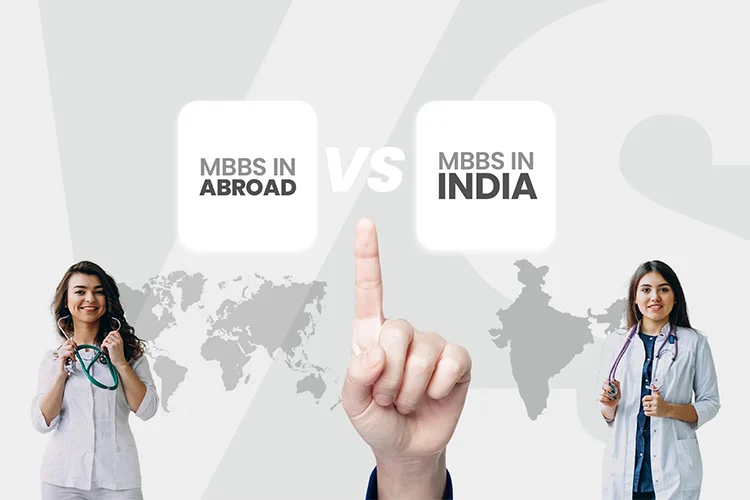
Introduction
Every year, lakhs of students in India dream of becoming doctors. However, with limited MBBS seats, intense NEET competition, and the burden of high tuition fees, many aspiring doctors and their parents are now exploring MBBS abroad as a practical and affordable alternative. If you are confused about choosing between MBBS in India and MBBS abroad, Way2Worth brings you a clear comparison to help you make the right decision.
MBBS in India
Pursuing an MBBS in India comes with several advantages. An Indian MBBS degree is globally recognized, which means students don’t face any issues regarding legitimacy. The familiar environment eliminates cultural and language adjustments, allowing students to feel at ease. Moreover, training in Indian hospitals ensures smooth integration into the Indian healthcare system, making the transition into practice more straightforward.
However, the challenges are equally significant. With more than 20 lakh aspirants competing for barely one lakh MBBS seats every year, the pressure is immense. Private medical colleges come with exorbitant costs ranging from ₹60 lakhs to ₹1.5 crore, making them unaffordable for many families. Even government medical colleges, which are more affordable, have limited availability with only around 80,000 seats across the country. This intense competition leaves countless aspiring doctors without an opportunity to pursue their dream.
MBBS Abroad
MBBS abroad, on the other hand, has emerged as a viable alternative for Indian students. Countries such as Georgia, the Philippines, Russia, Uzbekistan, and Kazakhstan offer high-quality medical education at a much lower cost, usually ranging between ₹15–30 lakhs for the entire course. Most universities abroad are globally recognized by NMC, WHO, and ECFMG, giving students an internationally accepted degree.
Students also benefit from modern infrastructure, advanced laboratories, and clinical exposure in world-class hospitals. With English-medium programs available across most destinations, Indian students face minimal language barriers. Additionally, the multicultural environment builds confidence, adaptability, and global perspectives, preparing them to practice medicine anywhere in the world.
The main challenges of studying abroad include the requirement to clear the FMGE (soon to be replaced by the NExT exam) before practicing in India. Adjusting to life away from family can also be challenging at first, but with proper support systems in place, students usually adapt quickly.
MBBS Abroad vs MBBS in India – A Quick Comparison
When comparing MBBS in India with MBBS abroad, several key differences stand out. Seats in India are extremely limited due to high competition, whereas abroad, universities offer more opportunities with simpler admission processes. While studying in private medical colleges in India can cost between ₹60 lakhs and ₹1.5 crore, MBBS abroad offers the same degree at just ₹15–30 lakhs. Education quality in India is good but varies by college, while abroad, students get exposure to modern infrastructure and global teaching standards.
Language is another factor — in India, students usually learn in English or Hindi, while abroad, most universities teach in English. Admission to Indian colleges depends strictly on NEET scores and state quotas, while abroad, qualifying NEET is sufficient for direct admission. Global exposure in India is limited, but abroad, students interact with peers from multiple countries, gaining international perspectives. Recognition-wise, both paths are valid as universities abroad are NMC, WHO, and ECFMG-approved, depending on the country.
Why Way2Worth Recommends MBBS Abroad
At Way2Worth, we believe every student deserves the chance to fulfil their dream of becoming a doctor without facing unbearable financial stress. MBBS abroad offers an affordable and transparent fee structure along with globally recognized education. Our expert guidance helps students prepare for FMGE/NExT exams to ensure their smooth return to practice in India. Beyond admissions, Way2Worth provides complete support for visas, travel, and accommodation, ensuring a hassle-free journey. With over 1000 successful admissions, we have established ourselves as a trusted partner for MBBS abroad consultancy.
Final Thoughts
If you are able to secure a government MBBS seat in India, it is certainly an excellent choice. But if not, instead of spending ₹1 crore or more at a private medical college, pursuing MBBS abroad at one-third the cost gives you access to global exposure, modern infrastructure, and world-class education. The choice you make today can define your future. With Way2Worth by your side, you’re not just getting an admission — you’re securing a reliable partner who will support you throughout your medical journey.

